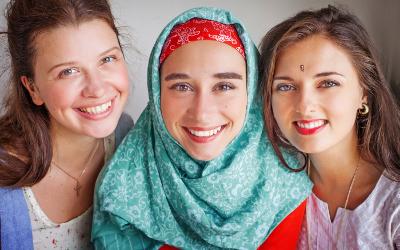OU research informs “Docutubes” to promote religious tolerance

OU researchers are working with groups of young people aged 12-22 year across the world on the making of short films to promote religious tolerance.
Dr John Maiden, Open University (OU) Senior Lecturer in Religious Studies, is leading one of the OU’s Open Societal Challenges: Tackling inequalities through creative engagement with histories of religious (in)tolerance project.
The Challenge is based on developing the EU-funded Religious Toleration and Peace project (Retopea) and bringing it to attention of policymakers. The project has also received external funding from the Culham St Gabriels Trust following a successful bid led by Professor John Wolffe. Dr Katelin Teller is employed as a Research Associate to support the project.
Between 2020 and 2023, the Open University team has involved 164 young people across the UK, Germany, Spain, Poland, North Macedonia, Belgium, Finland, Estonia, Albania and Jordan in this Docutube approach.
Topics ranged from religious tolerance in various locations to religion on the streets and in schools and through expression.
“We used this approach to invite them to think like historians and to use the creative process of making films to help them to make links between the past and the present and to take on board within this their own experiences of religious diversity,” said Dr Maiden.
The analysis of the findings, conducted by Dr Stefanie Sinclair, OU Senior Lecturer in Religious Studies and the OU’s Academic Lead for the Scholarship of Teaching and Learning, showed that 96% of those who completed the feedback forms said that they had enjoyed making the Docutubes and 81% said that the project had helped them to think of religious peace and toleration in new ways.
“This is important because earlier research into the ways in which young people think about religion and history indicates that they tend to think that religion is the problem,” said Dr Maiden. “Sometimes that is true, but there are also all kinds of examples from the past where societies have managed the realities of religious diversity based upon different practices and ideas of tolerance and co-existence.”
Further comments from participants included:
It has made me realize and think about religious peace and how my actions can help keep peace.
Filming and interviewing allowed me to learn about religious peace and understanding what other people think.
I have learnt about may other cultures and beliefs, I have learnt many new things and learnt about how much an impact religion has on many people.
The Retopea project has taught me that in history we have had events of peace between Muslims, Christians and Jews. Furthermore, I learnt that teamwork and collaboration can lead to great work.
That it was a very fun activity and a really good experience for us. We got to know and understand different things, different people.
About the OU’s Societal Challenges
The OU’s Open Societal Challenges Programme aims to tackle some of the most important societal challenges of our time through impact-driven research.
The Programme’s focus on the themes of Tackling Inequalities, Living Well and Sustainability aligns well with the OU’s mission to be open to people, places, methods and ideas.
The Programme’s aim is to apply excellent research by OU academics to some of the most pressing challenges facing people across the UK and worldwide to transform lives and drive societal change.
Contact our news team
For all out of hours enquiries, please telephone +44 (0)7901 515891
Contact detailsNews & articles

OU researchers lead international advances in planetary protection
Open University researchers are leading international advances in planetary protection, helping ensure that space exploration is safe, sustainable, and scientifically rigorous.